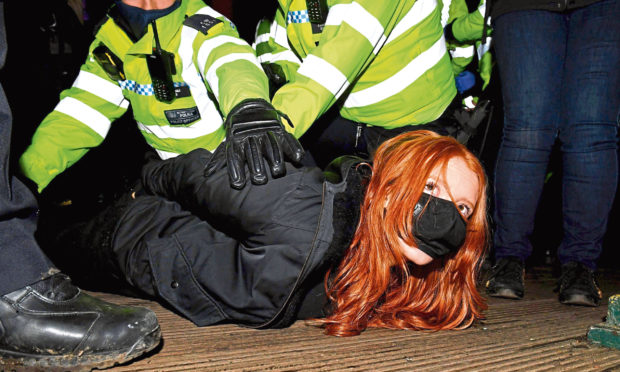As I write this, early in the morning, I can see my wife through the window. She is in the garden, sprinkling seeds for the birds and trying to stop Ruby the exuberant vizsla from instantly snuffling it all up, with limited success.
It’s a happy, even comical scene. It’s also Mother’s Day. There are presents and treats planned, and the promise of dinner made by our daughters. The sun is shining and the birds, watching for the few unsnuffled grains, are singing. Even the rain has stopped.
But still, I can see the tension in my wife’s shoulders. We have just had a long conversation about the events in London, where police have aggressively broken up a vigil for the murdered Sarah Everard.
Twitter, like my wife, is splenetic. A statement from the Met that there had been “an overriding need to protect people’s safety” is contrasted with that striking image of a masked, red-haired woman, staring into the camera while being pressed to the ground by police officers, her “safety” being protected good and hard. Cressida Dick, the Met Commissioner, is under intense pressure from Priti Patel, the Home Secretary.
#UPDATE | Statement from AC Helen Ball following #ClaphamCommon vigil
"We absolutely did not want to be in a position where enforcement action was necessary. But we were placed in this position because of the overriding need to protect people’s safety."https://t.co/HQpS0LD7TB
— Metropolitan Police (@metpoliceuk) March 14, 2021
Nicola Sturgeon, the First Minister, has joined thousands of other women in placing a lighted candle in her window to commemorate Sarah Everard and in support of the #ReclaimTheStreets movement.
Last week, our 19-year-old daughter was out for a walk with a friend, both of them bundled up in hats, bulky jackets, jeans and face masks. A work van went by and its occupants screamed obscenities at them. She tells me the same thing happened the week before but that she didn’t think to mention it because it’s not particularly unusual. I am reminded of the time not so long ago when, having briefly forgotten to turn the car lights on, she was pulled over by two policemen, one of whom drew his truncheon and snarled at this carload of three petrified teenage girls that it was “lucky you stopped, or I’d have smashed your f***ing window in”. After a few minutes more of this pointless intimidation, she was allowed to drive off. She had to stop around the corner because she was shaking so hard.
I’m reminded too of my mother, a successful, independent woman who, when she visited a bank for her first car loan, was told to come back with her husband. She has countless tales from over the decades of being followed home by men, or hassled in the street. My wife has been flashed at, catcalled, questioned inappropriately by swaggering blokes at a job interview, and threatened with the sack at eight-and-a-half months pregnant by a male boss for something she hadn’t done. Twitter is one long stream of women sharing similar horror stories.
I think of my two younger daughters. The youngest, still somewhat baby-fresh, sleeps, as she always has, clutching her toy mouse. Every time either of them leaves the house I quietly panic, because of the things that men do. I only relax once they’re safely home again.
You recognise all this, of course. If you’re a woman, you’ll have lived through similar incidents, and perhaps worse. If you’re a man, you’re aware of the environment which the women in your life are forced to endure each day. I trust you’re not one of the sly power-abusers or the creeping nighthawks.
In my ignorance and naivety, I thought we’d made it further along the road than this to equality and male accountability. All those big, powerful jobs – First Minister, Home Secretary, Met Commissioner and more – were proof, right? My daughters were stepping into a society where the barriers faced by their forebears were being torn down, and fast.
But no. Male entitlement, male insecurity and male rage will not be quelled. In a sense they’re only being provoked. Decades or even centuries of psychological conditioning, the presumption of greater physical strength, all that roiling testosterone, that expectation of workplace superiority, the urge to dominate and humiliate, is a hard stain to lift. Male toxicity, from a million daily microaggressions through to rape and murder, is the deadly pandemic for which there is seemingly no vaccine.
It is women who must suffer through this grotesquerie, making constant judgements about where to go and when, about who they can trust – about, as one Tweeter put it, “being able to walk home without going missing”. And though I will listen, support and where possible act, what will that amount to? I will feel frustration, contempt and gender-shame, but what does that change? What can laws and marches do against the wind?
No answers, no optimism, just lots of questions. How are women to be freed from the sins of men?
